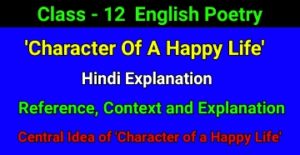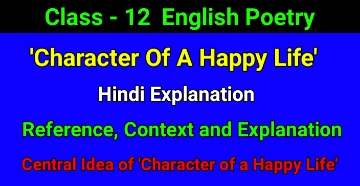Character Of A Happy Life
‘Character Of A Happy Life‘ composed by Sir Henry Wotton

How happy is he born or taught
That serveth not another’s will;
Whose armour is his honest thought,
And simple truth his utmost skill!
Stanza – 1. वह व्यक्ति जन्म अथवा शिक्षा से कितना प्रसन्न होता है जो दूसरों की इच्छा के अनुसार कार्य नहीं करता है। जिसका ईमानदारी का विचार ही उसका सुरक्षा कवच होता है तथा साधारण सच्चाई ही उसकी सर्वोत्तम योग्यता होती हैं।
Whose passions not his masters are,
Whose soul is still prepared for death;
Untied unto the world with care
Of princely love or vulgar breath;
Stanza – 2 जिसकी इच्छाएं उसकी मालिक नहीं होती हैं। जिसकी आत्मा सदैव मृत्यु के लिए तैयार रहती है। जो सांसारिक चिंताओं से मुक्त होता है। उसे न तो राजा के स्नेह की चिंता होती है और न ही साधारण लोगों के आलोचनाओं की परवाह होती है।
Who hath his life from rumours freed,
Whose conscience is his strong retreat;
Whose state can neither flatterers feed,
Nor ruin make oppressors great;
Stanza – 3 जो अपने जीवन को अफवाहों से मुक्त रखता हो। जिसकी अंतरात्मा ही उसकी मजबूत शरण स्थली हो। जिसकी अवस्था न तो चापलूसी करने वालों का पालन पोषण कर सकती है और न ही उसका विनाश विनाश करने वाले को महान बना सकता है।
Who envies none whom chance doth raise
Nor vice; who never understood
How deepest wounds are given with praise;
Nor rules of state, but rules of good;
Stanza – 4 वह उन किसी से भी ईष्या न करता हो जो अवसर से विकास करते हैं और न ही बुराई करता हो। जो कभी भी न समझ पाए कि प्रशंसा से कितने बड़े गहरे घाव दिए जाते हैं जो राज्य के नियमों को न मानता हो बल्कि अच्छाई के नियमों का पालन करता हो।
Who God doth late and early pray
More of his grace than gifts to lend;
Who entertains the harmless day
With a well-chosen book or friend;
Stanza -5 जो ईश्वर की शाम और सुबह प्रार्थना करता हो। उपहार प्राप्ति की अपेक्षा अधिक कृपा प्राप्ति के लिए। जो दिन को बगैर हानि के एक अच्छी प्रकार से चुनी गई किताब अथवा मित्र के साथ व्यतीत करता हो।
This man is free from servile bands
Of hope to rise, or fear to fall;
Lord of himself, though not of lands,
And having nothing, he hath all.
Stanza – 6 यह व्यक्ति दासता के बंधनों जैसे उठने की अभिलाषा या गिर जाने के भय से मुक्त होता है। यह स्वयं का मालिक होता है यद्यपि संसार का न हो और इसके पास कुछ भी न होते हुए सब कुछ होता है।
‘Character of a Happy Life’
Central Idea of the Poem ‘Character Of A Happy Life’
The central Idea of the poem ‘Character of a Happy Life’ composed by Sir Henry Wotton is that – In this poem the poet describes the qualities of a really happy man. A happy man is honest and truthful. He is the master of his passions. He is not afraid of death. He does not care for the love of the king or the criticism of the common people. He is free from rumours. He depends upon the voice of his consience. He does not care for false flattery. He is not jealous of anyone’s progress. He is a God-fearing man and remembers Him day and night. He passes his time in the company of a good book or a good friend. He does not care for rise or fall in life. He is rich in heart and is Lord of himself.
Explanations of some important stanza of ‘Character of a Happy Life’ with reference and context :
How happy ……….. skill.
Reference – This stanza has been taken from the poem ‘Character of a Happy Life’ composed by Sir Henry Wotton.
Context – In these lines the poet describes the qualities of a really happy man.
Explanation – The poet says that a really happy man is not dependent on others. He does not work according to the will of others. He is free to do what he thinks proper. Further the poet says that a really happy man is not slave to anyone. He does not need any weapon to protect himself. Honesty is the only weapon for him. It is his sure defence. He believes in simple truth of life. This simple truth is his best skill.
This man is ………… all.
Reference – This stanza has been taken from the poem ‘Character of a Happy Life‘ composed by Sir Henry Wotton.
Context – In these lines the poet describes the qualities of a really happy man.
Explanation – The poet says that a happy man is a man of free nature. He loves freedom. He does not care for rise or fall in life. Success does not make him happy and failure does not discourage him. Further the poet says that a really happy man is Lord of himself. His desires are under his control. Such a happy man may be poor in wordly wealth but he is the master of all the world in the true sense.


